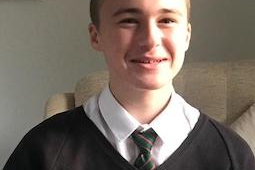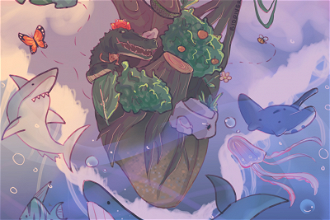Columban Competition: What will it take for a post-racist world?

Cara Treacy
The following article came third in the British section of the Columban Schools Competition, 'Let's create a world without racism'. Sixteen-year-old Cara attends Sacred Heart of Mary Girl's School, Upminster, in East London. Competition results have been released in the lead up to the International Day for the Elimination of Racial Discrimination on 21 March 2021.
One day, there may be a world where people can learn and look at racism as something that happened generations ago, as something that has transcended from the present to the past. As something that is no longer present in streets and organisations, but in textbooks and museums. As something that is no longer utilised and weaponised but remembered and considered. A world where racism becomes as inexplicable as the atrocities we now study and look back on centuries later.
That world is still far from the one we live in now. Racism is its own kind of unique mutating virus, constantly and persistently evolving and surviving through each decade despite the wearing attempts to stamp it out.
Martin Luther King is best known for his speech where he hoped his, "four little children will one day live in a nation where they will not be judged by the colour of their skin, but by the content of their character". That speech took place in 1963, and five years later it was recorded that black households earned around 60% as much as a white household in the United States. Now, 52 years later, that figure is still the same. Racism hasn't diminished in the half-century since the racial revolutions in the way most people have expected. It lurks in the workplace, where black men statistically face the highest rates of unemployment in Britain, it lurks in our bank accounts and incomes where 50% of black and minority children live in poverty, and it lurks in the crevices of our most trusted organisations.
Many people may feel that the majority of people no longer hold racist views. It is not just through someone's verbal abuse or physical attacks that racism is present, but through their subconscious and biased thoughts that our society structurally imposes. This covert form of racism is what restrains our world from ridding itself from racism; it is what creates the impenetrable structural and institutionalised racism. The Guardian reported once that the group most likely to self-admit they were racist were 'white, professional men' aged between 35 and 64, 'highly educated and earning a lot of money'. The omnipresence of the 'white, professional' man in almost every position of power that upholds society is unequivocal, and when groups of people who admit they hold racist views are granted positions that dictate and control our world, that world becomes infected with that unique, mutating virus of racism.
A Christian is someone who follows in the example of Christ, who once whittled down the entire religion to the sole belief of loving one's neighbour. There is no clearer message for the remedy to racism: love - an inherent and infallible love that does not falter at the difference in skin colour or race is the vaccine of the mutating virus of racism. That vaccine is in short supply.
Pope Francis said in his reaction to the death of George Floyd that, "we cannot tolerate or turn a blind eye to racism". When people deny the existence of an institutionally racist society, we allow racism to seep further and further into the crevices of our society. When we don't point out and illuminate inequalities and injustices, we blanket and hide what is fundamentally wrong. Those of us who are eager to declare the world rid of racism and state that we are living in the utopia of post-racist world, are not tackling the issue of racism and are instead helping its clandestine growth by refusing to acknowledge it.
Vatican II stated that 'any kind of...cultural discrimination in basic personal rights on the grounds of ... race, colour... must be curbed and eradicated', and this idea has been consolidated and echoed by many other significant Catholic figures. The Pope's most recent encyclical 'Fratelli Tutti' extends to the notion of 'as a single human family', a world that does not divide itself on the premise of race but unites itself for the opportunity for diversity and growth. It is in our individual desire to learn and develop as Christians that we will progress to a post-racist world. When we educate ourselves on the inequalities that black people and minorities are confronted with, we will be capable of understanding the necessary routes we need to take to remove the obstacles they face.
The vaccine for racism does not lie within stagnant laws and empty promises or facades people show, but in the motivated love we need to show and use to harness change. We cannot wait for world leaders to solve these problems. It is in our own personal choices and conscious choice to unroot racist bias that permeates through society that our own actions will eventually accumulate to create a world without racism. A world without racism is not an eventuality, it is something that can only be galvanised and created by the actions and thoughts of the people of today.
LINK
Columban Competition: www.columbancompetition.com/


















